Written by Mike Cervantes 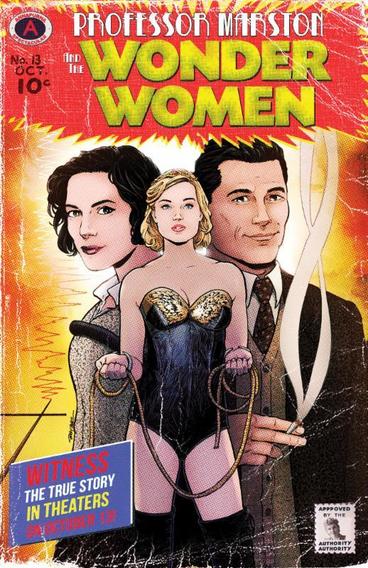 It’s that time of the year again, that dismal lull between summer and Thanksgiving where a young geek’s heart is made to…reach like a mother to get his film review column completed. But, something altogether strange yet fortunate happened. This past May, we had an amazing time watching Wonder Woman, the Patty Jenkins-directed, Gal Gadot-starring inspirational first film outing for the comic Amazon, that which gave us a glimmer of hope that some good can come from DC’s Zack Snyder-driven continuity. And some comic book fans acknowledged, as they often do, that the history of the creation of Wonder Woman is just as inspirational a story as the character herself. Therefore, in this gap following the milestone that is Wonder Woman’s first solo theatrical film, we get Professor Marston and the Wonder Women, a biopic from director Angela Robinson, a high-end independent film that delves into the ahead-of-his time college professor whose life circumstances came together to give us one of America’s most inspirational and iconic superheroes, feminine or otherwise. It’s somewhat unfortunate, that the life of an individual, whether or not they receive due billing, gets reduced to a simple punchline. The one involving William Moulton Marston is a rather tongue-and-cheek observation that America’s most prominent female superhero was created by a professor in a polyamorous relationship with two women, which also happened to involve some recreational bondage. In the era of Fredric Wertham’s Seduction of the Innocent, these things were shocking, while in our time that, and a plate of hors d'oeuvres would be considered a fun weekend. But there was a method to Marston’s madness, which this film points out, in addition to pulling the double-duty of giving the two women in his life more than due credit. The film opens in the era of Wertham’s seduction, where Marston, played handsomely by Luke Evans, bears witness to a ritual book burning of his comic creation. We then flashback to his time as a tenured professor, with his equally intelligent and scholarly wife Elizabeth (Rebecca Hall) at his side. When Marston reveals an almost instantaneous attraction to his student, Olive Byrne (Bella Heathcote), Elizabeth feigns a lack of interest, while simultaneously putting Olive into the hot-seat for her husband’s attraction to her. A bit of interplay between the characters ensues, where the trio learns to accept one another against the background of the invention of the polygraph. They make a few attempts to play the world’s game, as Olive is already engaged during her time as Marston’s assistant. But the pot inevitably boils over, and after one last turn on the lie detector, the three share a tryst behind a Greek pillar-bedecked drama classroom, hot enough to melt the cellophane, if this film weren’t produced digitally. 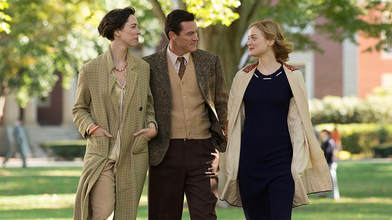 The continued symbolism that would eventually coalesce into the creation Wonder Woman purveys through the film. This not being a Warner Bros. Production, our view of the character is limited to glances at still images from the original comics, particularly during scenes where Marston has to explain the themes of his comics to a hard-nosed parental guardian named Mary (Monica Giordano). And while it may not be wholly accurate to the history of these individuals, the viewer can appreciate it when we see Olive as a sorority house member, with her especially large arm-bracelets in every scene. All of which leads up to a climactic moment wherein the three are participating in a bondage demonstration by Charles Guyette (J.J. Felid) and Olive emerges after an argument between Marston and Elizabeth in a bustier that just SCREAMS Wonder Woman. That gets directly contrasted with Mary’s accusation that Wonder Woman fights crime ‘in a swimsuit.’ Then there’s Marston’s own four-part DISC theory of behavior, the tent-posts of which are written on a blackboard at the beginning of each act, illustrating fully how in all moments, of life, bondage, and creation of fiction, we make this acquiescence. It has the usual flaws that most biopics tend to have. Marston seems enigmatic at times, and is only called out once for using his psychological theories as an excuse to indulge in his own personal fetishes. I also believe that Heathcote’s portrayal of Olive Byrne is a bit askew. She seems like a total innocent in the proceedings, even though it was mentioned once that she’s the niece of a famed feminist. I feel as though, even though the emotions of the cast don’t ring necessarily true, the film makes for a realistic portrayal of the circumstances this group has to go through. And even though Wonder Woman is never brought to the ideological center of this movie, the comic industry is portrayed quite realistically. I personally loved seeing Oliver Platt play famed DC Comics producer Max Gaines, someone clearly duller than the intellectual Marston, still seeing the possibility in his work. If they ever make a biopic about Gaines, I certainly hope that they still keep Platt in the role. Like with all biopics, Professor Marston and the Wonder Women is not an all-in-one clinic of the circumstances a legendary personality has to go through, but as I said in the beginning, the story of Wonder Woman as a whole is pointless without knowing at least a little about her creator, and more particularly, the women in his life who inspired the icon. This is an ideal complement to this summer’s past movie, and it will be interesting to see how much praise the film community will give to either this summer’s brilliant fictional portrayal of Wonder Woman, or this wonderfully down to Earth deconstruction.
1 Comment
Written by Zeke Perez Jr.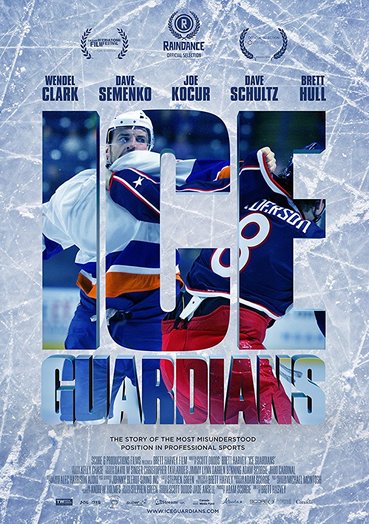 You may have heard the old adage, ‘I went to a fight and a hockey game broke out!’ Fighting in hockey is well-known among even the most casual of hockey fans, often featured in pop culture through films like Goon or websites such as HockeyFights.com. Fighting has become so ingrained in hockey culture and fandom that even this year’s Adidas replica NHL jerseys feature a fight strap, the tie-down on the back of the jersey used to prevent it from being pulled off during an altercation. No matter where you stand on fighting in the sport, the wonderfully enthralling documentary Ice Guardians will change how you view the players that go to battle. Ice Guardians was released in 2016 and has just been added to Netflix in October 2017. The film delves into the history of enforcers in the NHL with interviews by some of the most storied names to take on that role. A laundry list of players - including Scott Parker, George Parros, Eric Godard, and Wendel Clark, just to name a few - lend their voices to an eye-opening account of what it takes to be a career brawler in the AHL or NHL. They provide emotional tales of the ups and downs of the job, as well as a unique and personal insight into the future of enforcers and fighting in the league. Fighting is a polarizing feature in the hockey world; adored by many, abhorred by some, and recently targeted by the media and even by the league itself. The idea of banning fights was floated around a few years ago, but that was opposed handily by players and fans, especially die-hard fans. Often pegged as barbaric or unneeded, Ice Guardians counters by showing that hockey fights are anything but. 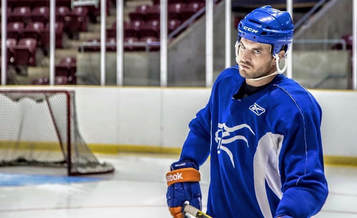 Players in the documentary argue that the media and other outsiders who dislike fighting often base their opinion on movies like Slap Shot or on particularly bad incidents that rarely occur. Enforcers usually aren’t portrayed accurately, labeled as dumb goons with few morals and fewer skills. The respect, ethics, and talent that go into the enforcer role are often overlooked. Personally, I was taken aback by scenes of players boxing and hitting the heavy bag, training to fight. I had taken for granted how much time and effort they put into honing their craft. As pointed out, none of them began playing hockey just to fight. They had the same dreams as any other youth hockey player. But with so few spots to go around, some had to adopt new skills to survive. Ice Guardians takes the time to address all sides of the topic. Featuring interviews from former enforcers, refs, reporters, fans, a criminologist, a mass behavior expert, and a neurosurgeon, the film provides the most interesting and holistic account of hockey fights to date. It takes the viewer through the highs and excitement of an enforcer’s life, making the case that hockey is actually safer when enforcers are patrolling the ice. It explains that, without enforcers, a team’s star becomes a target with nobody to protect him. Injuries and cheap shots pile up when there aren’t any fighters to keep the peace. But the film also addresses the darker side of things. While other players may be safer by having enforcers as teammates, the fighters themselves unfortunately face some dire challenges. As former player Zenon Konopka puts it, boxers fight once or twice a year, with gloves, while enforcers fight 20 to 30 times a season, bare knuckle, while on skates. Concussions and the mental toll of brawling night in and night out cast a shadow over the careers of many players. I grew up a fan of the Avalanche and of the guys who were willing to drop their gloves for the team. Over the years, I’ve cheered for (the aforementioned) Scott Parker, Adam Deadmarsh, Jeff Odgers, and Cody McLeod, among many others on a list that could keep going. Yet despite watching the sport for just about all of my life, there was still so much I learned from the film. Ice Guardians repaints what an enforcer is. It is a must-watch for hockey fans and has something to offer sports fans, documentary lovers, and anyone who has ever been intrigued by fighting in hockey. Written by Scott Edwards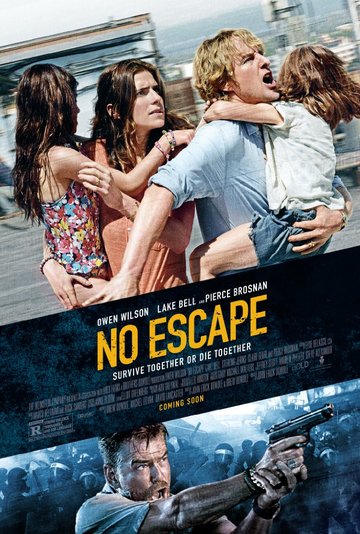 If something seems too good to be true, it usually is. Whether it is a free lunch at work, or a free weekend skiing, there is always a catch. The thought of free things in life is great and people know how to take advantage of it whenever they can. It is always best to try and figure out what these people want from you, your time, your money or something more that you are not willing to give. Being put in this situation many times, I always ask what the catch is, because overall, I am not willing to give up much for a free meal. Moving his family to Southeast Asia to run his company’s new water plant, Jack Dwyer is sitting on top of the world. Holding up in a hotel until his new home is ready, Jack and his family take notice that none of their normal devices are working, including their phone or internet. Thinking that this is the new world that they have moved into, that these necessities are not needed here, they go with the flow, but Jack is left to question why his company has not contacted him yet since he landed. But when Jack leaves his family to head to the market, he starts to see why he has been left in the dark as an uprising is about to take place. Seeing a massive group of locals facing off with the police, Jack rushes back to the hotel to get his wife Annie and daughters Lucy and Breeze. Understanding that foreigners are the targets of this mob, he must find a way to get his family to safety. With his daughter Lucy spending time at the pool, Jack knows that he is the only one that can keep her from what is about to become a blood bath. Rushing her up the stairs in the building, Jack is stopped by Hammond who was very interested in the family on their flight. Knowing that the roof of the hotel is the only safe place, Hammond sends the family Dwyer there to be rescued, but that is only a pipe dream. Hearing a helicopter making its way to save all of the Americans on the roof, they see that it is manned by the raging mob. As gunfire erupts and many of the survivors are mowed down in front of them, Jack and his family must find another way to save themselves. Being able to jump to the adjacent roof, it is only a matter of time before they are found and the locals do not care who gets in the way, as Jack is their primary target to get their rights back to their water. As their situation begins to look bleak, Jack is surprised to see that Hammond is their savior and is willing to lay his life on the line for the American family, but little do they know that Hammond is not what he seems. If you are looking for a movie full of running and action, well this is the one. While I am not a huge Owen Wilson fan, I must admit that he did deliver in the role and since I am a massive Lake Bell fan, I was willing to give it a try. I did not know what to expect when heading into this movie and after the locals started their attack, I was far from disappointed. With carnage running rampant all over the screen, all you can do is hope that Jack and his family are able to find a way to make it out alive, but I will warn you, it is not a pretty path. With machetes, automatic gun fire, plenty of blood and hatred towards foreigners in general, this movie has made me think twice about visiting a faraway land, even if it is for work. Yeah, not gonna do it for any amount of money, not ever again. Written by Scott Edwards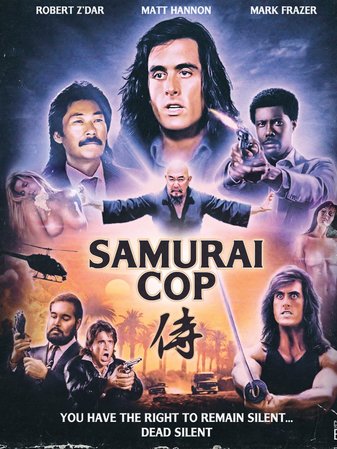 Every once in a while, a movie shows up on my recommended list that I have never heard of. This is a good thing, because when I go into the movie fresh with no real idea about what I am about to see, it can leave me feeling refreshed and stunned at the same time. Well, that can be said about a lot of movies and thank goodness, because if that was not the case, I would be very bored. This little gem from 1991 popped up on my list recently and anything that says, ‘cult classic’ is a must watch, especially since the sequel came out not too long ago. Arriving in Los Angeles to put an end to the Katana drug trade, Detective Joe Marshall is welcomed with open arms. His new partner on the beat, Frank Washington, is ready for action and that is good because the Katana group will not go down without a fight. Being able to track a van with a payload of cocaine on its way to the marina, Frank calls in a chopper to keep an eye on where everything is going. Interrupting the transaction, Joe gets behind the wheel of the car and is able to keep pace with the drug dealers and even captures one alive, even though he is burned from head to toe. Fujiyama is none too impressed to hear that the police are starting to sniff around his business and wants to know more about this new ‘Samurai Cop’, especially because he has his own samurai on staff as Yamashita is a go to for the difficult jobs. Hearing that one of his men has been captured, Fujiyama wants his code of silence followed and puts out the kill order on his former employee. With his henchwoman at his side and wearing a disguise, Yamashita is able to get into the hospital room and takes his co-workers head right under the watchful eye of the police. Being able to flee the scene of the crime with little to stop them, the couple is ready for their next job, but nothing will prepare them for what is coming. 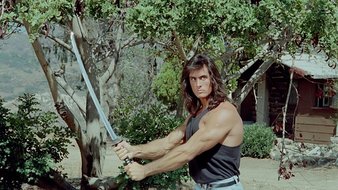 Joe and Frank are in hot water once again and losing the only living member of the Katana gang to be arrested, they need to start shaking some bushes to see what else they can get. Hearing about one of Fujiyama’s favorite hangouts, the two decide to give him a little scare. With threats of taking the boss in, the two leave only to find that Yamashita has a hit squad ready to take them out. Being able to defeat the goons, Joe and Frank are getting too close to the drug lord and now have targets on their backs. But that means little to Joe as he has his eyes set on the lovely Jennifer who seems to be the only good person in the middle of a bad situation. As the young love of his life is about to be swooned away by Joe, Fujiyama has her being watched. When it is seen that the samurai cop makes an appearance in her restaurant and is able to take her out on a date, that is enough for Fujiyama to take the next step. Finding out where the samurai cop lays his head at night, a full-blown hit is put out on Joe and the war comes into full swing. As one of the main members of the gang is hunted down for hiring the next round of enforcers, there is no stopping Joe and Frank from achieving their goal of wiping the Katana gang off of the map. But the opposition has something else in mind and will not go down without a fight and a sword battle. Cult Classic can mean a lot of things, but usually it means that the movie was pretty bad and even by my standards, this movie is pretty bad, but that is what has put it on my ‘you need to watch this list’ for many people. The best way to describe this movie is Lethal Weapon meets Kung Pow, without the great scripts and this movie features an excess of overacting. I would not say it is a refreshing movie, but it sure is a lot of fun to watch, I even had to watch it twice because I was laughing so hard. The dialogue in the movie is classic, I might have to try and use some of those lines when I get older and understand that they are talking about sex. With sword fights, a 2x4 arm getting cut off, plenty of double taps (even triple taps), a cop with long flowing hair and matching bikini bottoms, this is a must see for anyone that wants to add a smile to their day. Written by John Edward Betancourt 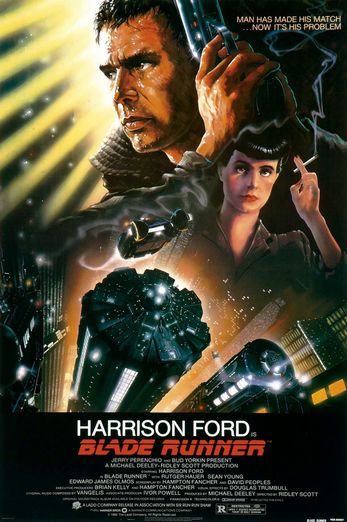 When it comes to truly being able to analyze the human condition and who or what we are as a species, there is no genre better at breaking down mankind than Science Fiction. After all, this is a genre that has made us ponder upon the dangers of technology when it is used for the wrong reasons, the horrors of playing God and most importantly...what it means to be human. By taking us into incredible situations, and places and times that right now only our imaginations can comprehend, what we are as a people is completely and utterly exposed and we are forced to look at the human condition and nothing more as we travel the stars or enjoy newfound comforts and of all the many human centric stories out there from this genre, one continues to stand out as one of the finest sci-fi has ever offered, 1982's...Blade Runner. This is one of those films that is so iconic and so powerful that the plot needs no discussion. We know it, and we love it...what matters more here is that we sit down and reflect upon how genius this film is when it comes to addressing the notion of what it means to be human, what a privilege that is as well and how the story does this in unique fashion. I say that because while one can discuss for hours on end the basics of the film, how the Tyrell Corporation essentially plays God and the Replicants serve as retribution for dabbling in things we as a species don't and never will understand...there is a deeper meaning to this film that is ironically enough explored by the Nexus Sixes that populate the story. 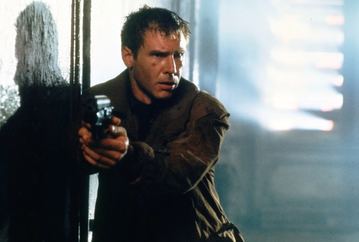 After all, these unfortunate beings cross the stars to return to earth, risking life and limb for one simple thing...more life. They are in many ways, misunderstood creatures that have nothing to lose that are seen as the villain when in reality, all they want is everything that we have. A long and fruitful life filled to the brim with experiences and memories that provide lessons and emotions to reflect upon for all of their days and well...it's a brilliant move for this film. Because this is where the story looks at the fact that who we are is a blessing and that in many ways, we take our lives for granted. In the case of Los Angeles, 2019, it is a world full of technology and comfort, for some, and hard work for others, but oddly enough the human characters are presented as two dimensional. They go about their day, do what must be done and enjoy their creature comforts to the best of their ability. Meanwhile, the Replicants are trying their damndest to preserve what precious memories they have, as is evidenced by Leon's return to the hotel to get his precious photos and perhaps forge new ones as well. They are fully aware of their mortality, and know that they must embrace every single moment since they will never come again and this is where the film's message comes to fruition. For what it means to be human, is to live life to fullest, enjoy this gift we have been given and to experience everything and anything we can and enjoy the good and the bad in the process, because we too have an expiration date and it seems as though the people of Deckard's world, have completely and utterly lost sight of this. They get by, moving from day to day, missing out on the sheer beauty of everything around them and that point is driven home by Roy's final words before he expires. However, what makes all of this work for the film, is the fact that this message is relayed in subtle and simple fashion. The movie never once crams it down your throat, it lets the story play out as natural as possible. Which means it is that rare breed of film that caters to so many. For those who want entertainment, they are treated to a beautiful dystopian future filled with incredible visuals, an engaging story and all around fun time. But for those who want more, the film is loaded to the brim with thoughtful moments and ideas that stay with you long after you've left the theater or turned off your DVD player. It is truly a modern classic, one that as the years progress, becomes more relevant to the times and our lives and one that always reminds us to enjoy everything that life has to offer and to celebrate the wonder of our humanity. |
Archives
March 2025
|
|
© 2012-2025, Nerds That Geek LLC.
All Rights Reserved. |
uWeb Hosting by FatCow


 RSS Feed
RSS Feed